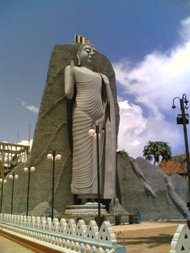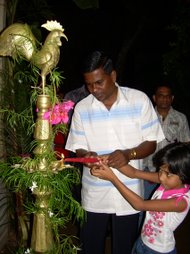Indigenous knowledge in traditional medicine |
| By Dr. Danister L. Perera Indigenous knowledge (IK) is practical common sense based on technologies and experiences passed on from generation to generation. This knowledge is more or less verbally and empirically transcended. Very few documented sources are available and these manuscripts are primitive, rudimentary and symbolic literatures. It is, knowing the country: it covers knowledge of environment and relationship between things. It is holistic — it cannot be compartmentalised and cannot be separated from the people who hold it. It is rooted in the spiritual health, culture and language of the people. This knowledge is entirely bound to the culture, territory and the natural resources. It is a way of life. It is an authority system. It sets out the rules of governing the use of resources. This knowledge accepts, recognises believes, and respects the nature and its powers. It has an obligation to share. It is dynamic, cumulative and stable. It is the truth which is secret, subjective, sacred and secular as well as spiritual. It can be called a system of knowledge. It is a wisdom which is integrated with all other sources of knowledge related to any life event. It is a way of life — wisdom of using knowledge in good ways. It is using the heart and the head together. It comes from the spirit in order to survive. It gives credibility to people. This knowledge is collective. Various researchers all over the world are interested in 1K but have not given an etymological explanation for this word A pattern of social intuitions Traditional Medicine is a pattern of social intuitions and cultural traditions that evolves from deliberate behaviour to enhance health. In the context of modern medicine traditional medicine is most of the time termed as ancestral medicine or primitive medicine which belongs to medical-anthropology. It is called Ethnomedicine that means those beliefs and practices relating to disease which are the products of indigenous cultural development and are not explicitly derived from the conceptual framework of modern medicine. In that sense the medicine man that played a major role in the primeval society in health care, was the origin of all aspects of health. The medicine man of the primitive society could not be regarded as the ancestor of the modern physician. He held a more important position than the physician of the modern society. He was the priest, sorcerer, physician, judge, policeman, soldier, more often the chief of the tribe and bard of the group since he knew stories about the tribe, songs, incantations, etc. thus he was the ancestor of most qf our professions. This medicine man or the healer of primitive societies held the wisdom of the nature. It is a time-tested and traditionally trusted knowledge. A traditional healer is a person who is recognised by the community in which he lives as competent to provide health care by using vegetable, animal and mineral substances and certain other methods based on the social, cultural and religious background as well as on the knowledge, attitude and beliefs that are prevalent in the community regarding physical, mental and social wellbeing and the causation of disease and disability. Development in the South Over the centuries, the countries of the South have developed their own ways of treating illness. These systems are known to international agencies as “traditional medicine.” In the past, these methods were often denigrated or ignored by medical profession in the north. Too often they were not considered worthy of notice because they were not based on the same scientific concepts as “modem medicine’ Sometimes their practitioners were referred to slightingly as “witch doctors” About 20 years ago, attitudes in the North began to change. During the 1970s, WHO, for example, set up a Working Group on Traditional Medicine. Writing in a special 1977 issue of the WHO magazine, World Health, the Director General, Dr. Halfdan Mahler said: “For far too long, traditional systems of medicine and “modern” medicine have gone their separate ways in mutual antipathy. Yet are their goals not identical - to improve the health of mankind and thereby the quality of life? Only the blinker mind would wish that each has nothing to learn from the other. WHO recognised traditional medicine because most of the world depends on it for primary health care, and its practitioners constitute a potentiality important resource for health-care delivery. In addition, medicinal plants used in traditional systems are very important to human health. Turn-around to the roots In the era of medical miracles such as antibiotics, telemedicine, genetic engineering, xenograft etc. we have a turn-around to roots again. The Twenty-ninth World Health Assembly recommended action to encourage the development of health teams trained to meet the health needs of the population.including health workers for primary health care, taking into account where appropriate the man power reserve constituted by those practising traditional medicine. (WHA29.72)6 In 1991, WHO defined traditional medicine “as comprising therapeutic practices that have been in existence, often for hundreds of years, before the development and spread of modem scientific medicine, and are still in use today. These practices vary widely, in keeping with social and cultural heritage of different countries. For the new millennium that definition became broader and more comprehensive. It says, the sum of total of the knowledge, skills and practices based on the theories, beliefs and experiences indigenous to different cultures, whether explicable or not used in the maintenance of health as well as in the prevention, diagnosis, improvement or treatment of physical and mental illness. Palm leaf tradition An eminent anthropologist, who conducted a research on health care system in Sri Lanka, commented on the traditional system of medicine. “Traditional healers in Sri Lanka — parampara vedamahattayo - preserve a medical knowledge, which is passed on from a teacher and is based on tradition of palm leave manuscripts. But the relationships between the traditional healers and their patients and the medicine prescribed preserve not only a medical knowledge, but also a knowledge and a wisdom, which is of a cosmological order. The Sri Lankan system of traditional medicine has been influenced and reinforced specially by the North Indian system of Ayurveda from ancient time as most of our socio cultural heritages. But the history and the tradition have explicitly revealed that existence of our own system of knowledge inherited by the people originated in this territory. At present it is too intricate to differentiate the genuine 1K from traditional Ayurvedic knowledge. The legal definition of the term “Ayurveda” in the Ayurveda Act No. 31 of 1961 includes the indigenous system of medicine (Deshiya Chikitsa).10 Supra-mundane origin This knowledge is considered to be the wisdom of a tradition which is sometimes claimed to be having a supra-mundane and para-human origin. It is common to any oriental tradition to entertain celestial sources of their own sciences, arts, literature, religion etc. This creates the sacredness which ensures acceptability and respectability through authenticity, validity, authority and legitimacy of the derivation. The erudite sagacious intellectuals called Rishis who secularise this divine discourse, were the linkage between extraterrestrial authors and earthly acquirers. All the holders of this kind of knowledge are treated as greater persons or leaders of the community as they are perceived to be useful and powerful. Also they traditionally live morally good lives reputed by the society. Therefore the learner or the student is expected to be having moral qualities accepted by the teacher or the holder of wisdom. In the process of acquisition of knowledge, this learner becomes an acolyte while the teacher holds his guardianship. Specific epistemology and ontology Traditional medicine has its own system of Epistemology and Ontology on nature and universe. That is called the theory of Macrocosm and Microcosm in which the universe represents the human and the human represents the universe. It expands hypothetical correlation between cosmological form of human biology and anthropomorphism of nature. The traditional system of indigenous medicine is neither merely a system of medicine nor a system of health care. It covers a broader area of life. Therefore it can be called a system of living or a way of life. It is not confined to diseases, ailments, illnesses, maladies, impairments, disorders or dysfunctions of the body or mind. It deals with religion, culture, rituals, environment, cuisine, agriculture, customs, norms, values, ethics, morals etc. This ranges from the inner seed of soul to outer boundary of universe. Definition The WHO definition of health says, “Health is a complete physical, mental and social well-being and not merely the absence of disease or infirmity.” The English word health literally means “wholeness,” and to heal means to make whole. (Both words go back to the Old English hal and the Old German heil, as does the English word “whole.”) To be whole is to be healthy and to be healthy is to be whole. Ancient Greek has two etymologically distinct words translatable as “health,” hygeia and euexia. Hygeia, the source of our word “hygiene,” apparently stands for the Indo-European ‘sugwiges’, which means “living well,” or more precisely, a “well way of living.” Euexia means, literally, “well habitness,” and in this context, “good habit of body.” The most appropriate term for the concept of healthy organism is homeostasis. It is explained as the constant conditions which are maintained in the body and might be termed equilibria. That word, however, has come to have fairly exact meaning as applied to relatively simple physio-chemical states in the organism which are so complex and so peculiar to living beings involving, as they may the brain, the nerves, the heart, the lungs, the kidneys and the spleen, all working cooperatively - that I have suggested a special designation for these states, namely, homeostasis.’ ---Daily Mirror |
"Star Lanka Online" Our NEW Web site And Web TV Channel Launched
TFGE , The Future Global Educational Center Has Launched
the official web site, called
*** Star Lanka Online Dot Com ........................
www.starlankaonline.com will be completed in very near future....
*** Star Lanka Online TV Channel,..................
Just One Click ahead ...
Now you can watch "Star Lanka Online TV" channel broadcasts from Matara, Sri Lanka in most part of the day. Still we are keeping a test transmission also. There is a link right side of your hand to watch our TV channel. You can watch (Click On the Box) live channel on this site without going to another site to watch the TV. and also recorded parts, following the below link.
the official web site, called
*** Star Lanka Online Dot Com ........................
www.starlankaonline.com will be completed in very near future....
*** Star Lanka Online TV Channel,..................
Just One Click ahead ...
Now you can watch "Star Lanka Online TV" channel broadcasts from Matara, Sri Lanka in most part of the day. Still we are keeping a test transmission also. There is a link right side of your hand to watch our TV channel. You can watch (Click On the Box) live channel on this site without going to another site to watch the TV. and also recorded parts, following the below link.
Place your Own Ad Here
Monday, January 7, 2008
Indigenous knowledge in traditional medicine
Subscribe to:
Post Comments (Atom)





















































1 comment:
Gostei muito desse post e seu blog é muito interessante, vou passar por aqui sempre =) Depois dá uma passada lá no meu site, que é sobre o CresceNet, espero que goste. O endereço dele é http://www.provedorcrescenet.com . Um abraço.
Post a Comment